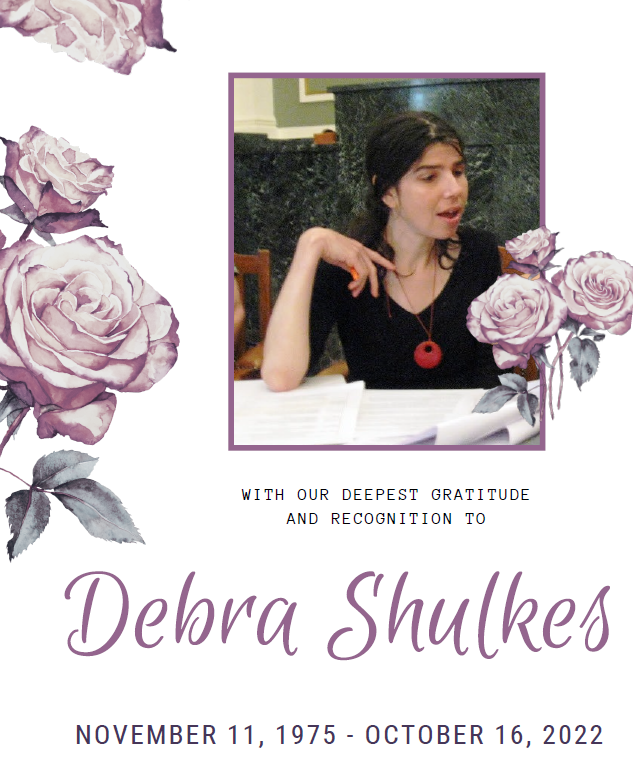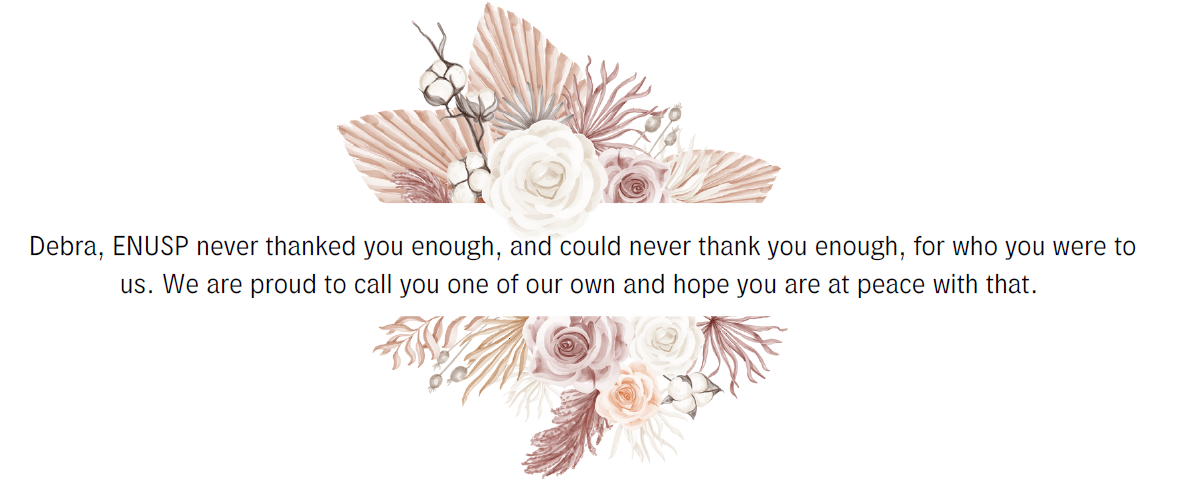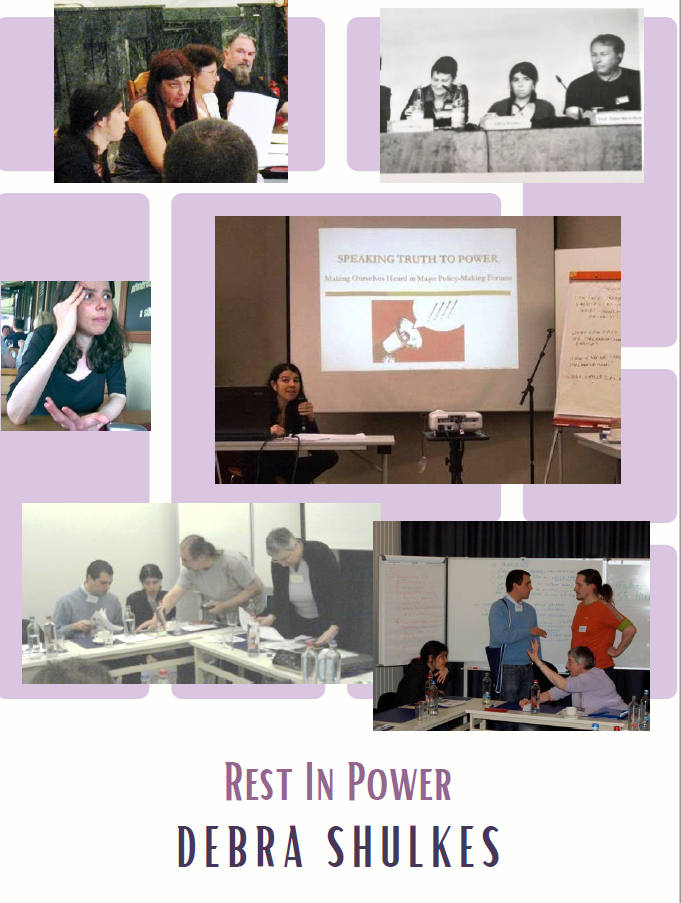 We have again lost one of our own, Debra Shulkes – a member of our community who contributed so
We have again lost one of our own, Debra Shulkes – a member of our community who contributed so
much to ENUSP – who was an inspiration, an example and a role model for so many of us when it comes to work and healing on our own terms and collecting and using wisdom and evidence to further our cause.
Finding a way to pay tribute to Debra that balances respect for her privacy and respect for her legacy is
not an easy task, but the world deserves to know how she left such an important imprint on so many of
her peers, readers and audiences and on the European Network of (Ex-)Users and Survivors of Psychiatry (ENUSP).
Debra joined ENUSP as an individual member in 2008. Originally from Australia, she was based in the
Czech Republic where she worked as a freelance writer and editor. When Debra discovered ENUSP, she
immediately offered her assistance as a volunteer, in particular to draft reports, press releases, position
papers and minutes of meetings. This was very much needed and highly appreciated – as well as
extremely beneficial for our organisation considering the outstanding quality of her writing and analyses.
In March 2009, Debra committed herself further by becoming a Support Board member of ENUSP,
responsible for key writing and administrative tasks, as well as gathering information on funding
possibilities. She attended and actively participated in the first ENUSP Empowerment Seminar in Brussels that year, made possible thanks to financing negotiated with Mental Health Europe – allowing ENUSP members from all over Europe to meet again in person.
And she did not stop there… with her instrumental and unforgettable contributions the very next year,
starting right from January 2010 when she volunteered to revive the ENUSP newsletter as Founding Editor.
Debra initiated and edited a number of beautiful and very professional issues of the “Advocacy Update”
newsletter for several years. At the same time, she always made it a point to collect relevant materials,
articles and information to share and cite in our interest. She said she saw her role as “looking for and
offering people ways to convey their concerns effectively for self‐advocacy and advocacy… I would like
everyone to know about the human rights instruments that should protect us all from psychiatric violence and degradation ‐ irrespective of the official laws and positions of our governments.” Her efforts to communicate and reach out to groups of (ex)users and survivors throughout Europe with the Advocacy Update newsletter truly paid off. It was because of her initiative to communicate the positions and work of our Network and the energy she put into it, that several new organisations joined ENUSP and some old member organisations became actively involved again.

That year in September, her motivation and spirit were part and parcel of the very memorable and inspiring 5-day 6th ENUSP Conference and General Assembly in Thessaloniki, which we have never seen the likes of since. Her teamwork and her vision for the “Re-building ENUSP” project lives on to this day when it comes to our strategy to take ENUSP forward. At this General Assembly, Debra was elected as our Deputy Board member for the Central region. After the event, Debra wrote and edited contributions for a virtual 210-page book for ENUSP with illustrations and pictures, that again, we have never seen the likes of since, testifying to this important moment in time for our organisation.
In December of that year,Debra went on to give a presentation on behalf of ENUSP at the European Council thematic conference held in Budapest on “Prevention of depression and/or suicide and other relevant contextual information”. She explained how we require “…alternatives to the prevailing psychiatric/pharmacological responses to suicidality and the importance of our active participation in research, planning, implementation and assessment of all suicide prevention efforts” and “the importance of environments and communities that help people want to live”.
Debra’s participation in September 2011 at the International Conference “Searching for a Rose Garden. Fostering Real Alternatives to Psychiatry” in Berlin was very well received and will never be forgotten by ENUSP members and way beyond. Using the metaphor of the conference title, Debra reminded us that “the determination of the global user/survivor movement to grow and safeguard this garden ourselves is evident in its extraordinary negotiation efforts leading to the adoption of the United Nations Convention on the Rights of Persons with Disabilities.”
In addition, Debra’s commitment and contributions to both content, as well as organisational work throughout the years 2011 and 2012 made it possible to continue with annual ENUSP Empowerment Seminars in Brussels and Bucharest. She devoted her skills to working on our funding application to the “Open Society Mental Health Initiative” making our dream of financing come true in 2012 and ENUSP finally had a rare opportunity to officially employ her.
And all this time, Debra was still able to focus on issues at home in the Czech Republic with her advocacy work on behalf of ENUSP. Along with other advocates, she exposed the extreme abuse and neglect caused by coercive psychiatric treatment in the form of cage beds, including a very effective submission to the UN Committee against Torture (CAT)in 2012 on our behalf demanding changes to public law and policy to put an end to this major human rights violation. She initiated a campaign to call on the international community to take actionagainst this “grotesque, degrading, and torturous practice (which) violates every aspect of human rights and dignity”.
Thinking of Debra, several members have said that they never knew anyone who contributed so much to ENUSP so intensely and over such a relatively short period of time. Sometimes enigmatic, sometimes very direct, open and demanding, Debra was able to share her experiences that so few of us dare express – laying bare our fears, our anger as survivors of psychiatry, the importance of self-identification, of our right to shift self-identification at different times in our lives and reject labels. She felt this could finally help us explore and understand our experiences in a transformative dialogue with others which many found possible with her. Debra always wanted to ask and explore these tough questions together, not necessarily to find immediate answers but to come to a better understanding.
ENUSP is immensely grateful to have encountered and worked with a person with such a curious-minded spirit, whose insight and intellect, along with her high-level skills and vast knowledge, made such a difference in the history of our organisation, even if she rarely wanted to take credit. With her own experience, she could understand and relate to so many of our members’ own experiences and navigate sometimes complicated dynamics in an ethical and respectful way.

To see or remember more about Debra’s involvement (including pictures):
ENUSP 2009 Empowerment Seminar Report (Brussels):
European Council thematic conference 2010 “Prevention of depression and/or suicide and
other relevant contextual information”:
6th ENUSP Conference and General Assembly 2010 in Thessaloniki, Greece.
International Conference 2011 “Searching for a Rose Garden. Fostering Real Alternatives to
Psychiatry”:
Russo, S. and Shulkes, D., What we talk about when we talk about disability: making sense
of debates in the European user/survivor movement, in Anderson, J. and Spandler, H.
Madness, Distress and the Politics of Disablement. Bristol University Press, pp. 27-42,
2015. Project MUSE
Tribute to Debra in pdf format
